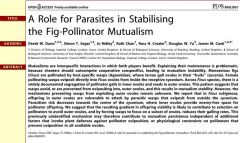Grade Level(s):
- 13-16
Source:
- UC Museum of Paleontology
Resource type:
- Annotated journal article
Time: Several class periods
Overview
This set of teaching materials aims to help instructors engage their students with the primary literature in evolutionary biology through a "journal club" that can be implemented in a discussion section or smaller class. It includes several helpful tools: annotated articles, a reading guide, additional suggested reading, and tips for students leading a discussion of a journal article.

- [Nature of science: Grades 13-16] Science focuses on natural phenomena and processes.
- [Nature of science: Grades 13-16] Scientific knowledge is open to question and revision as we come up with new ideas and discover new evidence.
- [Nature of science: Grades 13-16] A hallmark of science is exposing ideas to testing.
- [Nature of science: Grades 13-16] Scientists use multiple research methods (experiments, observational research, comparative research, and modeling) to collect data.
- [Nature of science: Grades 13-16] Scientists can test ideas about events and processes long past, very distant, and not directly observable.
- [Nature of science: Grades 13-16] Scientists may explore many different hypotheses to explain their observations.
- [Nature of science: Grades 13-16] The real process of science is complex, iterative, and can take many different paths.
- [Nature of science: Grades 13-16] Scientific findings and evidence inspire new questions and shape the directions of future scientific research.
- [Nature of science: Grades 13-16] Science is a human endeavor.
- [Nature of science: Grades 13-16] Authentic scientific controversy and debate within the community contribute to scientific progress.
- [Studying evolution: Grades 13-16] Our knowledge of the evolution of living things is always being refined as we gather more evidence.
- [Studying evolution: Grades 13-16] Our understanding of life through time is based upon multiple lines of evidence.
There are no NGSS/DCI concepts currently linked to this resource.
The Journal Club Toolkit was designed to be implemented in the discussion section of an evolution course or of an evolution-oriented introductory biology course and includes explicit instructions for doing so; however, the materials could be adapted to suit the needs and constraints of other class formats.
